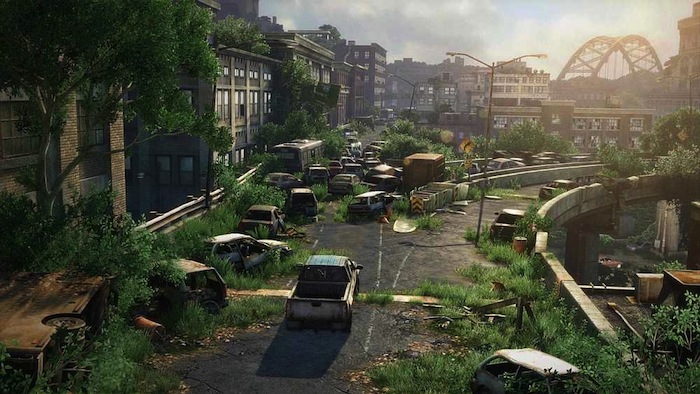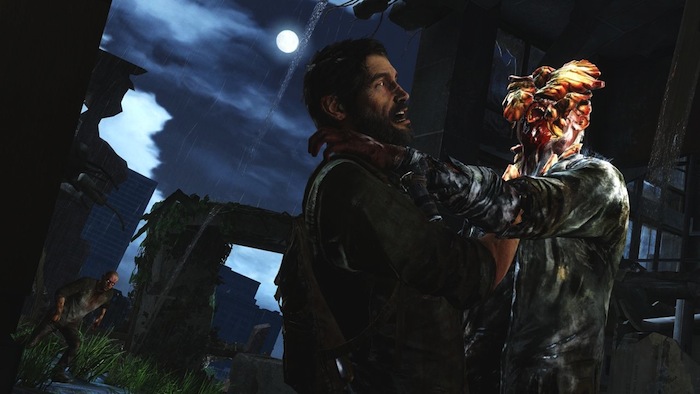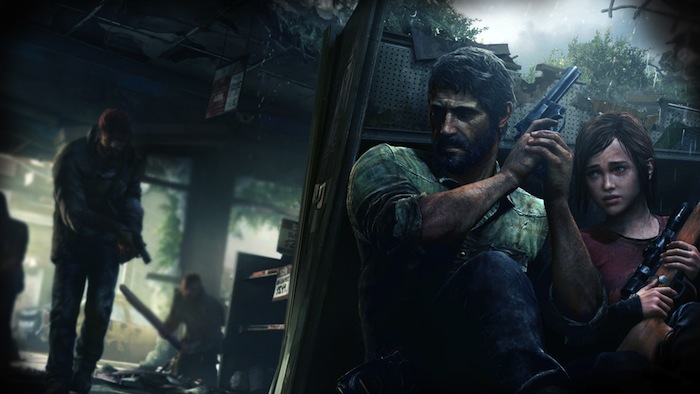A few years ago, developer Naughty Dog became a rising star in the third-person action-adventure genre with the launch of their Uncharted franchise. After the release of Uncharted 3, Naughty Dog opted to take a break from their wildly successful, established franchise in order to pursue a new IP. In what is essentially the PlayStation 3’s swan song, Naughty Dog’s The Last of Us has given the rest of us what can very nearly be described as the perfect game—and a pinnacle title for the console—from both a technical and artistic standpoint.
For the unfamiliar, The Last of Us is a third-person survival shooter set in a fallen, post-apocalyptic America. The story is a combination of the first half of The Stand, The Road, Children of Men, and the best of The Walking Dead. The mutated fungal epidemic that has ravaged the earth is based on the actual Cordyceps fungus—a species of fungus that quite literally zombifies insects in order to perpetuate itself. In the game, Cordyceps has mutated and gained the ability to infect humans, who are powerless to counter it. The story follows Joel, a hardened survivor of the plague that wiped away the world 20 years ago, and Ellie, a young girl born into the disease-ravaged, mutated, warring world of the present. Together, they traverse a hostile, infected landscape, in search of a little hope.
Let me get this out of the way right off the top. The Last of Us is a modern-day gaming masterpiece, and it may well be the best game released for the PS3, ever. If that’s the only thing you wanted to glean from this review, you could, in theory, stop reading right now (but please don’t). Accordingly, the rest of this review will be spent justifying this claim, rather than determining overall worth. But rest assured, if you have a PS3, your heart can handle survival horror, and you are in any way on this fence about this purchase, go buy this game now and thank me later.
From a technical standpoint, the game is nearly pitch-perfect. The ruined landscapes of America are at once breathtakingly beautiful and sad. The Last of Us transitions from rubble-strewn cityscapes reclaimed by nature, to rural farmhouses, to purple mid-West sunsets in the woods with nary a drop in framerate, and at no point do performance issues cause the game to chug or hinder the gaming experience in any way. From an aural perspective, it was important for the developer to get it right, especially due to the world Joel and Ellie inhabit, and get it right they did—every footstep, groan, or click is spatially accurate and suitably ominous. As for the score, while the music is never front-and-center in the game, the soundtrack composed by two-time Academy Award winner Gustavo Santaolalla floats seamlessly in and out of the gameplay, tugging and teasing at your emotions.

In many ways, death permeates this game, and your own mortality balances on a knife-edge. That I actually felt emotionally affected anytime Joel or Ellie died in the course of a fight is a testament to how relatable Naughty Dog’s protagonists remain, even in these most extreme of circumstances. Death means something, and like in no other game I’ve played in recent memory, killing means something, too. You’re made acutely aware as the game progresses that while you have a cause for which you fight and kill, other opposing causes exist that are no less worthy—but you must tread over them to pursue your own. Your opponents generally are not arranged in massive groupings for you to mow down, because each one moves and fights realistically, as a human opponent would. And your strength and physical vulnerability are not supernatural in nature, because Joel, too, fights realistically, as a human combatant would. And in the moments you play as Ellie, you feel her childlike vulnerability via a different play style than Joel’s—you’re forced to play differently, with more stealth and less power. Melee fighting is reminiscent of a street brawl—physical, brutal, and graphic. Anything at hand becomes a weapon, by necessity. This is pure survival. Bricks, bottles, walls, countertops, windows… in this game, you can feel the impact of a brick to the back of a skull. You feel bones break, crack, and shatter, and this serves to accentuate the bleakness, the desperation of this world in which you reside.
The flow of enemy encounters is generally intelligently handled and well-paced. Fighting rarely grows wearisome, as is so often the case in other games that feel simply presenting the player with repetitive hordes of endless cannon fodder qualifies as a solid gameplay mechanic. In this world, you’re forced to scratch and claw for your resources and in some situations, even this isn’t enough. The game’s leveling and crafting mechanics add to the haphazard atmosphere of a broken world. You won’t often find weapons or health kits wrapped neatly up in a package, waiting for you on a conveniently-located floor tile. No, you have to search and scratch and scavenge in every nook and cranny to find the individual, separate components of makeshift weapons and health kits, adding to the game’s sense of desperation and ruin.

The gameplay of The Last of Us, as you might imagine in a game of this ilk, is largely stealth-based. In many cases, it’s wiser to attempt to sneak around enemy combatants or infected rather than to engage them. This element is frequently used to brilliant effect by Naughty Dog when it comes to building atmosphere and tension. Let’s just say there’s a sequence involving a hotel basement, a power generator, an automated door, and a horde of infected that will literally have you cowering in fear as you play. It’s that good.
There are, of course, a few flaws. There isn’t a lot of variance available in terms of enemy type. Accordingly, as you level up your weapons and person, the game’s enemies stay static (save for some of the human combatants)—an aspect which some might fairly fault. Furthermore, partner AI is a bit disconcerting at times, as your allies occasionally run directly in front of infected and enemy combatants while you are attempting to stealth your way through a section. However, the developer has corrected for this by making partners virtually invisible to enemies, which is strictly speaking a cheat, but an effective one. By and large, though, the gameplay is engaging, and its raw, visceral emotion matches up well with that of the story.
In this game, the moments between the tense gameplay feel even more important than the action, itself, because these are what drive forward the game’s star attractions—it’s story and the relationship between Joel and Ellie. The Last of Us is at its best in the quiet moments between firefights and puzzles—moments in which we can see and feel the strengthening bond between the two main characters. Indeed, it is with no slight to any other facet of the game that I say the story and character development of The Last of Us are the game’s greatest triumphs. You want to go out of your way to find abandoned comic books for Ellie so she feels just a little bit happier. Ellie pulling out her pre-apocalypse jokebook for levity at a moment’s notice is heartwarmingly earnest and sweet:
“People are telling apocalypse jokes like there’s no tomorrow.” Too soon…?
The emotional impact of the pain and suffering both characters have endured goes a long way toward making you, the player, root for them both, and the ways in which they try to help one another slowly heal is truly artistic and sincere. The companions you meet along the way are meaningful, as well, as the game does a wonderful job of ensuring you see the humanity—the flaws and strengths—of all those you meet. From the friends you fight with, to those you’re forced to leave behind, each and every one connects with the gamer in some significant way. There are no superficial allies.
I generally prefer not to allot numerical scores to game reviews. They’re too much of a blunt instrument in instances that are often best served by evaluating nuance—at least, when not dealing with the absolute dreck of the field. I’ll continue to adhere to this principle here, so let it suffice to say that The Last of Us is at once a tragic, heartwarming, painful, beautiful, and emotional experience, and is the best game you’ll buy for the PS3 this year, if not ever.
The Last of Us is available now on the PS3 at a retailer near you.
Pritpaul Bains regularly covers gaming news for Tor.com, and will continue to do so throughout the zombie apocalypse and beyond. Follow him on Twitter @pritpaulbains










